CivicScience regularly tracks the ups and downs of the nation’s emotional well-being, which correlates strongly with consumer behavior. With Mother’s Day quickly approaching, and with May being Mental Health Awareness Month, what key insights can we learn about the well-being of women and mothers in the United States?
As a whole, Americans are continuing to feel an uplifted mood. The collective emotional well-being of U.S. adults as measured by the CivicScience Well-Being Index held relatively steady from month to month, falling a mere 0.1 percentage points from March to April.

Join the Conversation: How often do you feel very happy?
Additional data show that older Americans (aged 55+) reported declining well-being, while middle-aged Americans (aged 35-54) reported improved well-being and adults under age 35 remained relatively steady, balancing out the collective average.
However, a look at gender shows a wide disparity between men and women. The reported well-being of women in the U.S. did not change month over month, but consistently remained much lower than that of U.S. men and well below the national average. The workplace may be one area contributing to women’s lower well-being – CivicScience data from March show that just 38% believe they are fairly compensated for their job, compared to 51% of men.
Parents in general tend to report lower well-being than Americans who are not parents, although their well-being did improve from March to April. Yet, mothers report the lowest overall sense of well-being at just 52.5% in April, which ranks behind the average of U.S. women and far behind that of U.S. fathers.

There is likely a cocktail of reasons contributing to why U.S. mothers report higher levels of negative emotions such as stress and lower levels of positive emotions such as happiness, with the workplace being one. Given that moms continue to experience disruptions to their work and home life due to the effects of the COVID-19 pandemic, the gap in well-being comes as no surprise. And with the summer months ahead, vacation planning may also be adding to stress levels, as recent data show mothers are more likely to be the ones making travel arrangements for their families.
To learn more about emotional well-being and its effect on consumer behavior, get in touch.
What is the CivicScience Well-Being Index?
Attitudes change before behaviors do. That’s why the CivicScience Well-Being Index captures the collective emotional well-being of the population on a daily basis, by asking thousands of survey respondents to report on how strongly they feel different emotions. Through living indexes like the Well-Being Index, CivicScience helps businesses and organizations better understand what’s driving consumer choices, empowering them with the data-driven insight needed to navigate our rapidly changing times.








